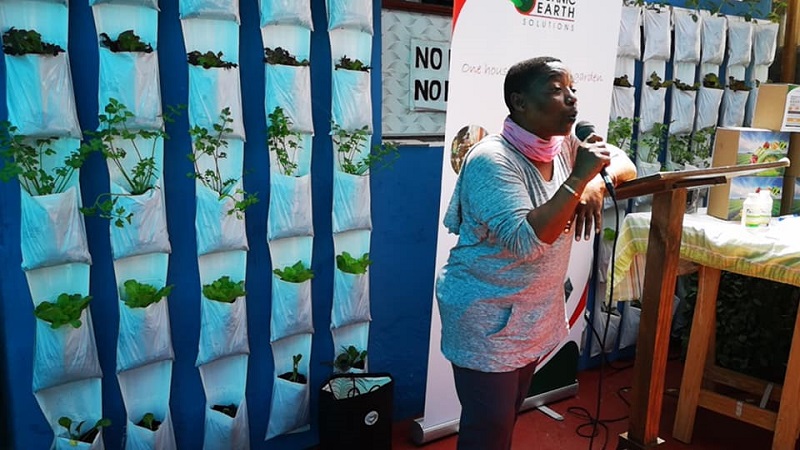Laughter echoed from the garage of a Tafelsig home in Mitchells Plain on Friday morning, where an exciting initiative was announced to create a sustainable local food project. In commemoration of World Food Day on 16 October, a collaboration between Tafelsig Mitchells Plain Community Action Network (CAN), Organic Earth Solutions and Agri Urb came to fruition. The project is aptly called ‘One Household One Food Garden – bringing the farm back into the City one garden at a time’. Despite the bleak circumstances, many residents find themselves in, Friday was a glimmer of hope.
This partnership consists of a diverse group of individuals that have a common goal, committed to sustainable development; empowering and educating individuals and communities of the benefits of food security making a positive impact within our communities. Leading the charge is Tafelsig community activist, Joanie Fredericks who had the vision to create a sustainable way of providing food in vulnerable communities.
The vast majority of people who live in disadvantaged communities in South Africa lack consistent access to proper nutrition. They currently purchase most of their vegetables from commercial supermarkets and are therefore subject to escalating food prices, resulting in them choosing cheaper, less nutritious foods. There are clear links between the consumption of vegetables and better health yet lack of vegetable consumption is often among the main cause of health issues. Just under half of South Africa’s population, some 27 million people, live below the global poverty line and are unable to afford the cost of nutritious vegetables. Food insecurity in marginalized Cape Town communities has been exacerbated by the Covid-19 lockdown.
This project aims to enable people from all walks of life to be able to grow their own food using innovative and affordable urban farming systems. Joanie has personally selected the individuals that will be part of this project and together with Organic Earth Solutions experts, she is determined to make it a success.
AgriUrb founder Shaun Kearns said that the ‘Garden in a box’ concept was started five years ago alongside the help of Organic Earth Solutions founder and CEO Jeremy Walters. The box contains ten variety of seasonal seedlings, organic fertilizer, plant booster, pest control, water retention saving product (which saves 30-40% water in the ground), trigger sprayer which is able to be screwed on to any bottle and an instruction manual where and how to plant.
“We are not just addressing food security; we’re also addressing water security. When it comes to sustainability and not relying on the current food system, people need to become self-sufficient. One household growing (crops) is not going to feed a community. But, when you have 40, it automatically becomes an exponential number where food starts moving around that community,” said Kearns.
Kearns explained that he teamed up with Fredericks after watching her hard-hitting video on Facebook called “What about the people”. Moved by her call pleading to the government for help in providing communities with food, AgriUrb tried to assist in the most beneficial way they could.
At least 30 boxes and ten vertical gardens were donated to community members to promote the growth of organic food in a sustainable manner. MC Mark Lottering had the attendees in stitches as the various stakeholders took to the podium and described their commitment to the project.
Since the start of lockdown five months ago, Fredericks said that government only supplied limited food parcels and made ‘’an attempt at the R350 grant’ for the unemployed. Beyond that, Fredricks said, President Cyril Ramaphosa failed to cater to the hunger as he “promised”.
“It’s such a struggle for people to access these things. It became clear to us that we, as a society, will have to self-organize. If government and the president were serious about feeding the people then, months later, we wouldn’t have found ourselves in this position.”
“Funding is at an all-time low because most of the people that had sponsored were institutions and private individuals. There is only so much people can do before they bleed themselves dry. It’s always been on my mind that we must become self-sustainable at some point,” added Fredericks.
The activist explained that some residents had become “entitled’ to assistance and that something needed to be done.
“For me, that is the worst thing ever. I can understand hunger. But when people start acting as if they must get, (asking questions) like ‘what time do you dish’ or ‘where is my bread’… then clearly there is a problem.”
“It became critical to start teaching people how to work for themselves because if we don’t do it now while we are facing Covid-19 lockdown, we might wake up too late…when people are too deeply settled in this entitlement syndrome,” she said.
Fredericks emphasised that the garden not only promotes self-reliance and provides nutritional value, but it can also become a source of income.
The garden in a box is available for purchase at a cost of R750, R100 of which is donated to the Tafilsig CAN group for community development. Half the harvest is dedicated to feeding schemes in the area.
“We hope to get more people in Tafelsig interested because the idea is that each household should have a garden and then after that, we would like to expand and make sure that the community start taking care of themselves,” said Fredericks.












 WhatsApp us
WhatsApp us 

